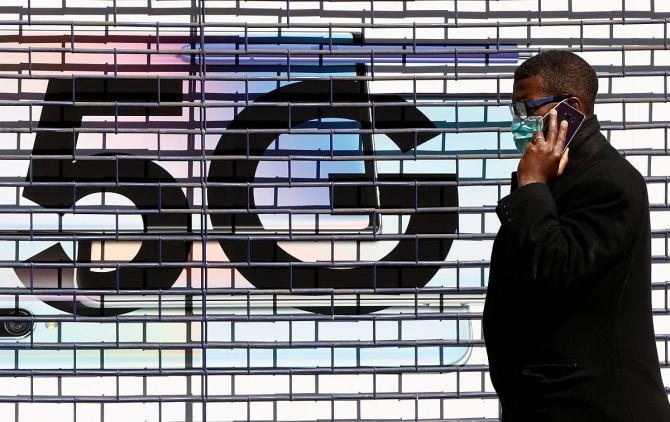For 5G players, new-use cases could be the key for making money in the immediate future.
Surajeet Das Gupta reports.

Consumers can expect a 5G launch in the country soon.
Telecom companies (telcos) say if auctions take place on time — the target is July — they would be able to offer some services in a few cities by the end of this year and a full roll-out from 2023.
But the question is: will 5G turn the tables for telcos financially?
Will average revenue per user (ARPU) improve?
Will mobile consumers upgrade to 5G quickly and pay more?
Will the expanded functions that 5G enables drum up sufficient revenues?
In simple terms, will telcos make more money?
Much would depend on the auction base price for 5G spectrum.
Telcos have demanded a 95 per cent reduction in base price suggested by the Telecom Regulatory Authority of India (TRAI) and a long, staggered payment scheme.
That apart, industry estimates that operators have to fork out $7-10 billion as incremental investment to roll out a pan-India 5G service for over five to six years, and that excludes spectrum price.
That is why not everyone is pushing the 5G pedal.
Telcos recall how the shift from 2G/3G to 4G was accompanied by a price disruption unleashed by new entrant Reliance Jio.
The result was disastrous: ARPUs fell from Rs 126 a month in FY16 to a mere Rs 73 by FY19.
They inched back in September 2021 to Rs 108 but still not near 2016 levels.
So the question is: will recent telco history repeat itself?
Vodafone Idea Ltd, which has been hit hardest by price war, has not minced words, informing the regulator that the commercial launch of 5G has not been accompanied by a quick, significant uptick in ARPUs even globally.
Data from over 23 countries where 5G has been launched shows that in most of these countries, the ARPU has a zero or negative compound annual growth rate over the first six to ten quarters of the 5G launch.
In countries such as Switzerland, Australia, UAE, UK, Germany and Canada, ARPUs fell in the first seven to ten quarters.
Global research also acknowledges the fact that a technology change unleashes growth in other sectors and not necessarily to the provider of mobile service.
So mobile devices expect average sale price to go up as more and more customers lap up 5G devices even before services have begun (5G phones accounted for 20 per cent of total sales in 2021).
It benefits start-up players, with the rise of internet penetration, and also those outfits offering over-the-top services, which can now offer better streaming capability.
The auto sector, which will ride now on connectivity in the electric vehicle (EV) space, is another potential beneficiary.
So how do telcos monetise and get value from a 5G roll-out — at least in the immediate future before automated cars become a reality (a process that might take 5-10 years) and live gaming and movie streaming on augmented and virtual reality get scale (which might take 2-3 years)?
One area that has caught on globally and is relevant for India is using 5G to power fixed wireless access (where the last-mile connectivity of high-speed broadband is on wireless and not fibre) to homes and to millions of retailers who are becoming tech-savvy.
The reason is simple.
Penetration of fibre-to-the-home (FTTH) in the country is very slow (because of complicated right-of-way challenges), cumbersome and expensive.
That is reflected in the fact that there are only 17 million FTTH customers in India even though Reliance Jio and Airtel promise to hit large numbers (Reliance claims FTTH will be available to 50 million households).
Yet there are over 210 million TV households in the country and over 120 million pay TV households that can easily be tapped.
One way to reach them is to push 5G-powered fixed wireless access.
With FTTH ARPUs four to five times higher than on a mobile connection, this provides a huge opportunity to boost revenues.
Then, of course, there are over 30 million small retailers who are increasingly using broadband not only to order, deliver and pay but to get support in inventory management.
5G also offers the ability to sell differentiated offerings to consumers or businesses.
That is enabled by 5G network slicing-in with multiple virtualised networks within the overall network infrastructure.
For instance, a hospital may require assured and reliable ultra-low latency communication for robotic surgeries where connectivity cannot break at all.
Or an automated factory that has a myriad of machine-to-machine connectivity, which need to perform 24x7.
In all these requirements telcos will have to sign up service-level agreements with clients.
Some of the business opportunities are already being tested out.
TRAI, for instance, has prodded telcos in collaboration with service providers to undertake pilot projects to see how small cells (low-powered antennas with coverage of 10 metres to a few kilometres, which enable high data speeds) can be deployed in ports (Kandla), airports (Delhi), smart cities (Bhopal) and metros (Bengaluru) hosted on their “street furniture” (lighting poles, bus stands, signalling posts and so on).
The aim is to power 5G and automate operations, save costs and increase efficiency in these large infrastructure projects.
TRAI has also floated the idea of telcos setting up private networks (within, say, an entire factory), though some companies say they want spectrum at an administered price to set up this network on their own.
Most operators believe that 4G will prevail for at least another six or seven, and the move to the new technology will be very gradual.
According to a recent report by Nokia (based on independent research companies), India’s 5G subscribers would, on average, hit 350 million in 2026, which is only 30 per cent of the current mobile subscriber base.
For 5G players, new-use cases could be the key for making money in the immediate future.












 © 2025
© 2025